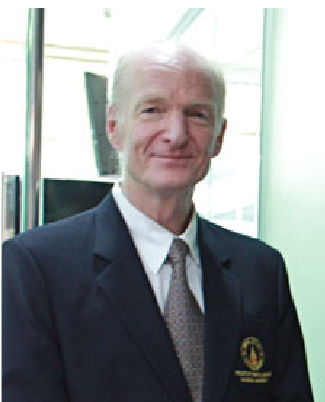
DR Nick White has become the first Thailand-based British expat for more than 60 years to receive a Knighthood from the UK government. The award, announced in the New Year Honours list, is “for services to tropical medicine and global health.”
His appointment as a ‘Knight Commander of the Order of St Michael and St George’ gives him the title ‘Professor Sir Nicholas J White FRS.’ Other than UK diplomats, it is believed that the last British expat based here to win this prestigious award was Sir James Holt in the years after WW2.
Sir Nick, 65, is a hugely respected figure in the world of tropical medicine, having worked extensively in Asia, Africa, the US, and Britain.
He began his career at Guy’s Hospital Medical School, graduating in 1974 as the best medical student across all of the University of London’s medical schools.
His first overseas experience was in Nepal where, under difficult conditions, he carried out work for the Britain-Nepal Medical Trust. After training as a junior doctor in the UK, he came to Thailand in 1980 as a lecturer in the ‘Wellcome Unit’, a collaboration between the University of Oxford and Mahidol University’s Faculty of Tropical Medicine.
His appointment as a ‘Knight Commander of the Order of St Michael and St George’ gives him the title ‘Professor Sir Nicholas J White FRS.’ Other than UK diplomats, it is believed that the last British expat based here to win this prestigious award was Sir James Holt in the years after WW2.
Sir Nick, 65, is a hugely respected figure in the world of tropical medicine, having worked extensively in Asia, Africa, the US, and Britain.
He began his career at Guy’s Hospital Medical School, graduating in 1974 as the best medical student across all of the University of London’s medical schools.
His first overseas experience was in Nepal where, under difficult conditions, he carried out work for the Britain-Nepal Medical Trust. After training as a junior doctor in the UK, he came to Thailand in 1980 as a lecturer in the ‘Wellcome Unit’, a collaboration between the University of Oxford and Mahidol University’s Faculty of Tropical Medicine.
Nick worked on the treatment of severe malaria, then a major problem along the border with Cambodia, and helped in studies on snake bites.
After a couple of years’ advanced training in Seattle and Oxford, he returned to Thailand in 1986 as Director of the Wellcome Unit at Mahidol. He expanded the Unit’s research into malaria, starting a new unit among the Karen refugees along the Thai-Burmese border.
He also established a new unit in Ubon Ratchathani to study melioidosis, a then little-known but terrible disease afflicting rice farmers in Northeast Thailand.
In 1991 he broadened his influence on global medical research by establishing a sister unit in Vietnam working on malaria, typhoid, tetanus, and other important infections.
Throughout the 1990s and 2000s, Nick oversaw large clinical trials of new drug treatments for malaria across Asia and Africa, work which has changed the way in which malaria is treated worldwide. He has published over 1,000 research papers, and has received numerous awards for his research and the impact it has had on health.
Sir Nick is also a longstanding and popular member of both the British Club and the Royal Bangkok Sports Club (RBSC). A keen sportsman with a legendary sense of humour, Sir Nick to this day plays cricket and squash. A highlight of his cricketing career came in the 1990-91 season when he was appointed vice-captain of the Thailand national cricket side. He is also a talented musician and cartoonist, and can occasionally be found playing the harmonica in various establishments.around Bangkok.
After a couple of years’ advanced training in Seattle and Oxford, he returned to Thailand in 1986 as Director of the Wellcome Unit at Mahidol. He expanded the Unit’s research into malaria, starting a new unit among the Karen refugees along the Thai-Burmese border.
He also established a new unit in Ubon Ratchathani to study melioidosis, a then little-known but terrible disease afflicting rice farmers in Northeast Thailand.
In 1991 he broadened his influence on global medical research by establishing a sister unit in Vietnam working on malaria, typhoid, tetanus, and other important infections.
Throughout the 1990s and 2000s, Nick oversaw large clinical trials of new drug treatments for malaria across Asia and Africa, work which has changed the way in which malaria is treated worldwide. He has published over 1,000 research papers, and has received numerous awards for his research and the impact it has had on health.
Sir Nick is also a longstanding and popular member of both the British Club and the Royal Bangkok Sports Club (RBSC). A keen sportsman with a legendary sense of humour, Sir Nick to this day plays cricket and squash. A highlight of his cricketing career came in the 1990-91 season when he was appointed vice-captain of the Thailand national cricket side. He is also a talented musician and cartoonist, and can occasionally be found playing the harmonica in various establishments.around Bangkok.



















